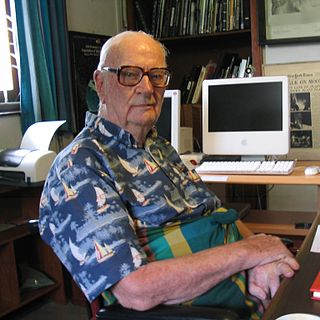
Hard science fiction is a category of science fiction characterized by concern for scientific accuracy and logic. The term was first used in print in 1957 by P. Schuyler Miller in a review of John W. Campbell's Islands of Space in the November issue of Astounding Science Fiction. The complementary term soft science fiction, formed by analogy to hard science fiction, first appeared in the late 1970s. The term is formed by analogy to the popular distinction between the "hard" (natural) and "soft" (social) sciences, although there are examples generally considered as "hard" science fiction such as Isaac Asimov's Foundation series, built on mathematical sociology. Science fiction critic Gary Westfahl argues that neither term is part of a rigorous taxonomy; instead they are approximate ways of characterizing stories that reviewers and commentators have found useful.
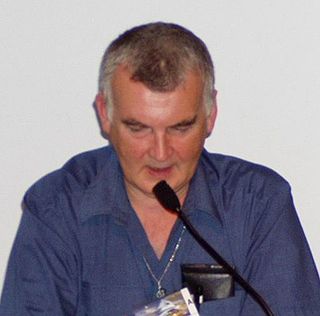
Kenneth Macrae MacLeod is a Scottish science fiction writer. His novels The Sky Road and The Night Sessions won the BSFA Award. MacLeod's novels have been nominated for the Arthur C. Clarke, Hugo, Nebula, Locus, and Campbell Memorial awards for best novel on multiple occasions. A techno-utopianist, MacLeod's work makes frequent use of libertarian socialist themes; he is a three-time winner of the libertarian Prometheus Award. Prior to becoming a novelist, MacLeod studied biology and worked as a computer programmer. He sits on the advisory board of the Edinburgh Science Festival. MacLeod has been chosen as a Guest of Honor at the 82nd Worldcon, Glasgow 2024

Gregory Dale Bear was an American writer and illustrator best known for science fiction. His work covered themes of galactic conflict, parallel universes, consciousness and cultural practices, and accelerated evolution. His most recent work was the 2021 novel The Unfinished Land. Greg Bear wrote over 50 books in total.

Glen David Brin is an American science fiction author. He has won the Hugo, Locus, Campbell and Nebula Awards. His novel The Postman was adapted into a 1997 feature film starring Kevin Costner.
George Zebrowski is an American science fiction writer and editor who has written and edited a number of books, and is a former editor of The Bulletin of the Science Fiction Writers of America. He lives with author Pamela Sargent, with whom he has co-written a number of novels, including Star Trek novels.
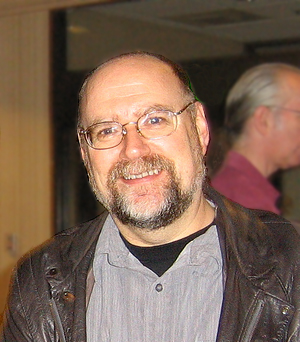
Robert Charles Wilson is an American-Canadian science fiction author.

Robert James Sawyer is a Canadian and American science fiction writer. He has had 24 novels published and his short fiction has appeared in Analog Science Fiction and Fact, Amazing Stories, On Spec, Nature, and numerous anthologies. He has won many writing awards, including the best-novel Nebula Award (1995), the best-novel Hugo Award (2003), the John W. Campbell Memorial Award (2006), the Robert A. Heinlein Award (2017), and more Aurora Awards than anyone else in history.
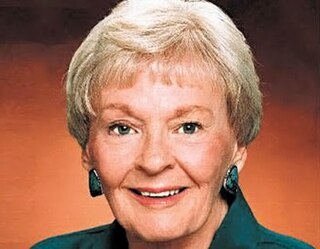
Sheri Stewart Tepper was an American writer of science fiction, horror and mystery novels. She is primarily known for her feminist science fiction, which explored themes of sociology, gender and equality, as well as theology and ecology. Often referred to as an eco-feminist of science fiction literature, Tepper personally preferred the label eco-humanist. Though the majority of her works operate in a world of fantastical imagery and metaphor, at the heart of her writing is real-world injustice and pain. She employed several pen names during her lifetime, including A. J. Orde, E. E. Horlak, and B. J. Oliphant.

John Joseph Vincent Kessel is an American author of science fiction and fantasy. He is a prolific short story writer, and the author of four solo novels, Good News From Outer Space (1989), Corrupting Dr. Nice (1997), The Moon and the Other (2017), and Pride and Prometheus (2018), and one novel, Freedom Beach (1985) in collaboration with his friend James Patrick Kelly. Kessel is married to author Therese Anne Fowler.
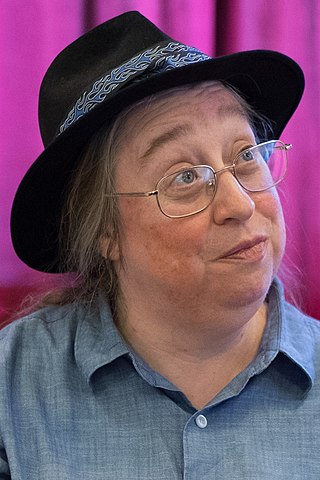
Jo Walton is a Welsh-Canadian fantasy and science fiction writer and poet. She is best known for the fantasy novel Among Others, which won the Hugo and Nebula Awards in 2012, and Tooth and Claw, a Victorian era novel with dragons which won the World Fantasy Award in 2004. Other works by Walton include the Small Change series, in which she blends alternate history with the cozy mystery genre, comprising Farthing, Ha'penny and Half a Crown. Her fantasy novel Lifelode won the 2010 Mythopoeic Award, and her alternate history My Real Children received the 2015 Tiptree Award.

Mark W. Tiedemann is an American science fiction and detective fiction author. He has written novels set in Isaac Asimov's Robot universe, and within his own original universe, known as the Secantis Sequence.

Christopher Priest is a British novelist and science fiction writer. His works include Fugue for a Darkening Island, The Inverted World, The Affirmation, The Glamour, The Prestige, and The Separation.
Bradley Clayton Denton is an American science fiction author. He has also written other types of fiction, such as the black comedy of his novel Blackburn, about a sympathetic serial killer.

Trudi Canavan is an Australian writer of fantasy novels, best known for her best-selling fantasy trilogies The Black Magician and Age of the Five. While establishing her writing career she worked as a graphic designer. She completed her third trilogy, The Traitor Spy trilogy, in August 2012 with The Traitor Queen. Subsequently, Canavan has written a series called Millennium's Rule, with a completely new setting consisting of multiple worlds which characters can cross between. Though originally planned as a trilogy, a fourth and final book in the Millennium's Rule series was published.

Science fiction is an important genre of modern Japanese literature that has strongly influenced aspects of contemporary Japanese pop culture, including anime, manga, video games, tokusatsu, and cinema.
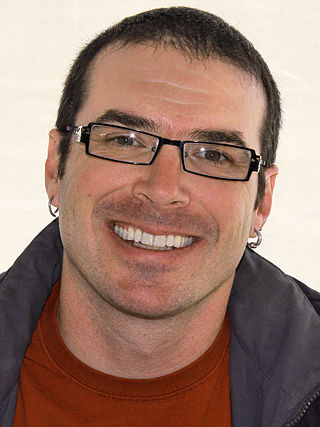
Paolo Tadini Bacigalupi is an American science fiction and fantasy writer. He has won the Hugo, Nebula, John W. Campbell, Compton Crook, Theodore Sturgeon, and Michael L. Printz awards, and has been nominated for the National Book Award. His fiction has appeared in The Magazine of Fantasy & Science Fiction, Asimov's Science Fiction, and the environmental journal High Country News. Nonfiction essays of his have appeared in Salon.com and High Country News, and have been syndicated in newspapers, including the Idaho Statesman, the Albuquerque Journal, and the Salt Lake Tribune.
Diversicon is an annual speculative fiction convention held in July or August in the Minneapolis-Saint Paul, Minnesota area. Diversicon provides programming and social opportunities to encourage the multicultural, multimedia exploration and celebration of SF by those within and outside of the traditional SF community. Diversicon includes both live and posthumous guests. It is sponsored by SF Minnesota.

Pyr was the science fiction and fantasy imprint of Prometheus Books, launched in March 2005 with the publication of John Meaney's Paradox. In November 2018 it was sold to Start Publishing.
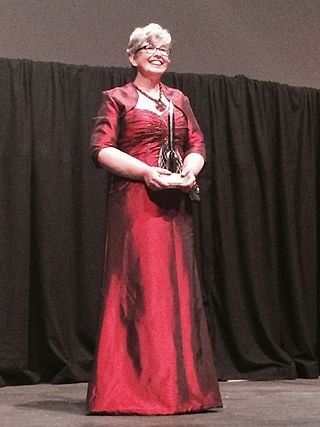
Ann Leckie is an American author of science fiction and fantasy. Her 2013 debut novel Ancillary Justice, in part about artificial consciousness and gender-blindness, won the 2014 Hugo Award for "Best Novel", as well as the Nebula Award, the Arthur C. Clarke Award, and the BSFA Award. The sequels, Ancillary Sword and Ancillary Mercy, each won the Locus Award and were nominated for the Nebula Award. Provenance, published in 2017, and Translation State, published in 2023, are also set in the Imperial Radch universe. Leckie's first fantasy novel, The Raven Tower, was published in February 2019.
















